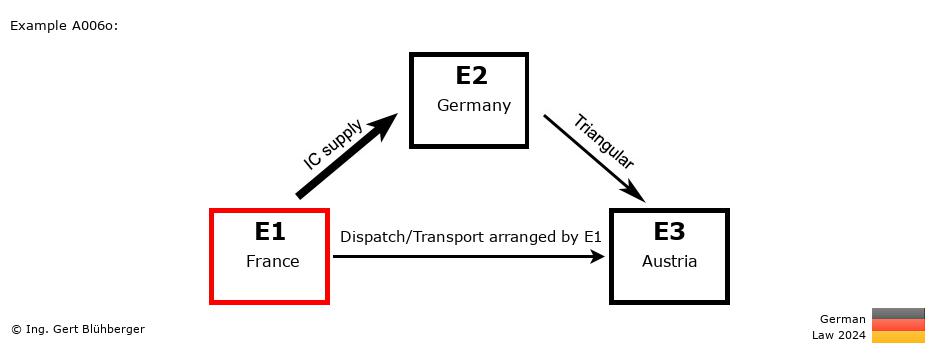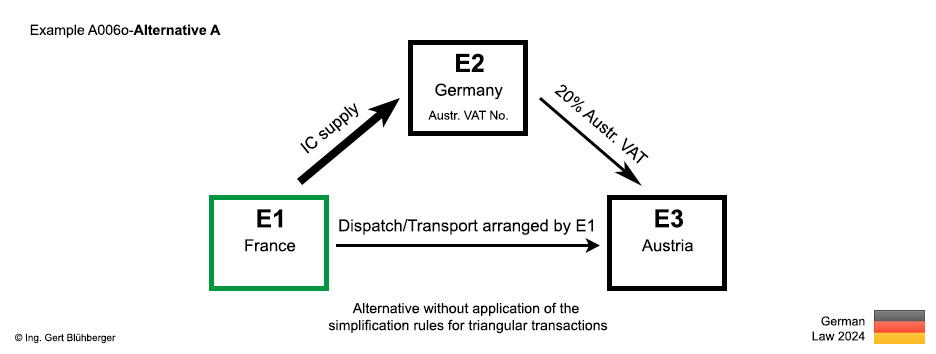Facts:
An Austrian entrepreneur E3 (= last purchaser) orders a machine from his German supplier E2 (=1st purchaser). Since the supplier E2 does not have the machine in stock, he orders it from the French wholesaler E1 (=first supplier) and instructs him to dispatch the machine directly to the Austrian entrepreneur E3. Brief description of the triangular transaction:
- Registration obligations:
- Due to the simplification rule for triangular transactions (§ 25b UStG), no registration is required for the first purchaser E2 in the country of arrival.
- "Supply 1" from E1 (France) to E2 (Germany)
- Assignment of transport or dispatch according to § 3 (6) UStG in conjunction with § 3 (6a) sentence 2 UStG
- VAT-exempt supply in France (E1)
- Tax exemption pursuant to § 4 (1)(b) UStG in conjunction with § 6a UStG (intra-Community supply)
- "Supply 2" from E2 (Germany) to E3 (Austria)
- Transaction without transport/dispatch assignment (§ 3 (7) UStG)
- Taxable supply in Austria (E3)
- Triangular transaction according to § 25b UStG
- Special feature of this triangular transaction
- Due to the application of the simplification rule for triangular transactions (§ 25b UStG), the tax liability of the German entrepreneur E2 is transferred to the Austrian entrepreneur E3 (reverse charge procedure).
Detailed description from the perspective of the individual entrepreneurs: From the perspective of the 1st supplier E1 (from France): From the perspective of the 1st supplier E1 (from France):
Outgoing Invoice:
- Invoicing:
Invoice without VAT with reference to the tax exemption (intra-Community supply) pursuant to § 4 (1)(b) UStG in conjunction with § 6a UStG (or alternatively with reference to Article 138 of the Directive 2006/112/EC) and specification of the own (French) VAT identification number as well as the (German) VAT identification number of the German entrepreneur E2.
No indication to the triangular transaction has to be made on this invoice!
- VAT Return:
Declaration of the sales transaction as an intra-Community supply.
- EC Sales List (ESL / Recapitulative statement):
Declaration as (intra-Community) supply to the (German) VAT identification number of the German entrepreneur E2.
No labeling as a triangular transaction!
- Intrastat Supplementary Declaration (Intrastat SD):
Declaration as dispatch to Austria. Since 2022, the country of origin and the (Austrian) VAT identification number of the Austrian entrepreneur E3 must also be reported. If the recipient E3 in the country of destination is unknown, as a surrogate the generic VAT identification number which consist of the 2-digit country-code of the invoice-recipient (E2) supplemented with 12 times the figure "9" (DE999999999999) has to be reported.
 From the perspective of the 1st purchaser E2 (from Germany): From the perspective of the 1st purchaser E2 (from Germany):
Incoming Invoice:
- VAT return:
The incoming invoice does not include VAT. The intra-Community acquisition of the middle entrepreneur in a triangular transaction is deemed to be taxed and therefore not to be included in the VAT return. It is a prerequisite that the entrepreneur E2 proves that such a triangular transaction exists and that he has met his obligation to report (by inclusion of the outgoing invoice to E3 in the ESL).
I.e. even though the entrepreneur E1 reports an intra-Community supply, the entrepreneur E2 does not have to report an intra-Community acquisition.
- Intrastat Supplementary Declaration (Intrastat SD):
The first purchaser E2 has no reporting obligation in triangular transactions.
Outgoing Invoice:
- Invoicing:
The invoice must be issued without VAT and contain the following information: "Triangular transaction according to § 25b UStG" (or alternatively with reference to Article 141 of the Directive 2006/112/EC) and "Transfer of the tax liability pursuant to § 25b (2) UStG" (or alternatively with reference to Article 197 of the Directive 2006/112/EC) (see also 25b.1. (6) UStAE). In addition to the own (German) VAT identification number, the invoice must contain the VAT identification number of the Austrian entrepreneur E3.
- VAT Return:
Due to the simplification rule of the triangular transaction, the tax liability from this supply transfers to the Austrian entrepreneur E3. The value of the outgoing invoice must nevertheless be recorded in line 33/code 42 (Supplies of the first purchaser in intra-Community triangular transactions according to § 25b UStG).
- EC Sales List (ESL / Recapitulative statement):
Declaration of the sales transaction to the (Austrian) VAT identification number of the Austrian entrepreneur E3 and labeling as a triangular transaction.
 From the perspective of the last purchaser E3 (from Austria): From the perspective of the last purchaser E3 (from Austria):
Incoming Invoice:
- VAT return:
The incoming invoice contains no VAT, but the reference to the existence of a triangular transaction and the transfer of tax liability. The Austrian entrepreneur E3 must therefore calculate the tax himself based on the Austrian tax rates and include it in the VAT return on the one hand as "VAT according to § 25b (2) UStG" and on the other hand as "input VAT from intra-Community triangular transactions according to § 25b (5) UStG". This is a zero-sum game, and does not result in any payment burden.
- Intrastat Supplementary Declaration (Intrastat SD):
Declaration as arrival from France.
Notes to the triangular transaction:
- The above detailed descriptions from the perspective of the individual entrepreneurs represent only an indication of how the tax assessment would be if the German laws were to apply in France and in Austria. National deviations from the German legislation were also not taken into account in the chain transaction sketch and the brief description!
- You can find the German version in the reihengeschaeftrechner.de.
- The assessment of this triangular transaction from the Austrian perspective you can find in the reihengeschaeftrechner.at.
- Alternative A: If the simplification rule for triangular transactions should not or may not be applied (e.g. if the German entrepreneur E2 is domiciled in Austria), then the supply from E2 to E3 is taxable in Austria (20% Austr. VAT) and the German entrepreneur E2 must register in Austria if he is not already registered.
|


